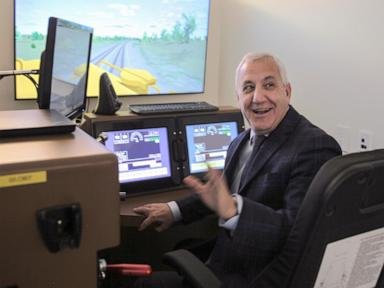OMAHA, Neb. — Union Pacific delivered 7% growth in its second-quarter profit even though the number of shipments it hauled remained essentially flat because it was able to continue streamlining its operations.
The Omaha, Nebraska, railroad said Thursday that it earned $1.67 billion, or $2.74 per share, in the quarter. That’s up from last year’s $1.57 billion, or $2.57 per share, before CEO Jim Vena took over after a hedge fund pressured Union Pacific to improve its profitability.
“This provides further proof that our strategy to be the best in safety, service, and operational excellence will drive success,” Vena said. “The entire Union Pacific team is energized behind this strategy and wants to win.”
The results topped the prediction for earnings of $2.72 per share from the analysts surveyed by FactSet Research.
Vena said in a letter to employees reflecting on his first year on the job that he’s proud of the way employees have responded to the “challenges that come with operating the largest railroad in North America” and improved service as he expects more and more of them.
“I said from day one I would ask a lot of you, and demand even more from myself,” Vena said.
The improvement at UP has come through many different changes across the railroad as it worked to continually increase the length of its trains while limiting the size of its workforce. Vena said the next improvements will come as the railroad continues to get employees thinking about how Union Pacific can handle more freight efficiently as they try to convince companies to ship more by train
“Hopefully what I bring a little bit of that is just knowing where to push, where to look and how to lead and get the culture going the right way,” Vena said. “Driving decision-making down to the front level so that they make the decisions locally because they’re better off making them locally — the decisions — than somebody in Omaha.”
During the quarter, Union Pacific dealt with widespread flooding across the heart of its network, but Vena said the railroad was able to recover quickly and get its trains moving again.
Union Pacific said its revenue grew 1% to top $6 billion in the quarter as it was able to continue raising its rates enough to offset a steep drop in coal and metals shipments and lower fuel surcharge revenue. That was just behind the $6.05 billion that analysts predicted.
Coal shipments that have been steadily declining for years were down 22% in the quarter and metals shipments fell off 12%, but overall volume was up slightly and Union Pacific was able to continue increasing the average maximum length of its trains 2% to 9,544 feet and productivity improved 5% to 1,031 car miles per employee.
The railroad was able to cut its expenses 4% to $3.61 billion in the quarter.
CFRA Research analyst Colin Scarola said Union Pacific’s ability to control costs helped it beat expectations and sets it up well for the future.
Union Pacific said it remains hard to predict whether volume will be up overall through the rest of the year but the railroad remains confident that its profits will improve and it expects to buy back about $1.5 billion of stock this year.
Edward Jones analyst Jeff Windau said in a research note that Union Pacific’s efforts to get more efficient will help it deal with the current weak manufacturing growth and slow housing construction. Then the railroad will be well positioned to profit once volume does grow.
Union Pacific operates trains across 23 states in the western half of the country.
